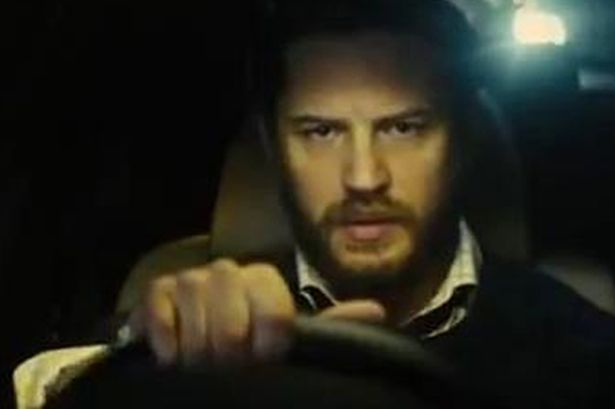
Locke is the last name of the guy driving the car in the movie Locke. For the duration of the film he is driving down the highway, fielding calls from his job, his wife, sons, and the woman who is in the hospital having his baby. The action, which includes among other things a bitter break-up, problems with concrete pumping equipment, an emergency c-section, and a soccer game, unfolds in real time and, most remarkably, entirely off-screen. The film has a plot but it seems to me to be, above all, a film about time. They dynamic interplay of the past, present and future threads through the narrative like a car shifting lanes on the highway as it moves toward the future leaving the past in its wake.
While Locke and his car cruise single-mindedly down the highway, the various calls he takes on his speaker phone puncture this linear progression and multiple events start to play out simultaneously entirely off screen. The source of the action can be traced back to a single transgression from Locke’s past — a one night stand.
The one night stand (his only transgression in 15 years of marriage) ended in a pregnancy and Locke is hurrying to be present at the birth of his future child. He wants to be “present” at the birth to acknowledge his child because, as he says, it is the right thing to do. This notion of what is right comes from Locke’s own past experience. His father was not present at his birth. Only 20 years later did his dad present himself to Locke in the form of a looser wearing a tracksuit.
Locke calls his wife from the car to tell her what’s going on. He calls just as a big soccer game is about to start. He was supposed to be at home watching the soccer game. He wanted to tell her earlier. But now it’s too late. The baby is coming and he has to be there. Locke and his wife converse emotionally over several calls, with his sons (uninformed about the drama) popping onto the line to update their dad on the status of the game. Locke hopes that he and his wife can move on together. She, devastated, is in the process of condemning their relationship to the past (don’t come home, she says).
In order to get to the hospital for the birth Locke had to walk away from his job. He was supposed to be overseeing a “history-in-the- making” pour of concrete for the foundation of the area’s tallest building. His departure is the source of a series of mini-crises for the foreman who is left to handle the job. Locke engages in nimble problem solving as the challenges mount for the foreman (who has also been drinking). This story line plays out with a suspenseful play-by-play excitement, similar to that of a soccer game. Locked doggedly helps address each problem even though he has already been fired. His job, like his marriage, at this point is over.
Another part of this telephonic multi-tasking is the conversation between Locke and the woman he knocked up. She is alone and freaking out in a London hospital. He doesn’t even know her, however, like it or not she is both his part of his past and his future, and she is being whisked away into and emergency surgery. The umbilical cord is wrapped around the baby’s neck.
A great deal of suspense is built up around these multiple dramas. They are broken up by occasional, somewhat cheesy monologues with Locke, looking forward, into the rear-view mirror, cursing his deadbeat dad, whom he is addressing as if he’s sitting there in the back seat.
The irony of the tale is that in Locke’s single-minded need to be present for his new child he is absent for his son who calls him upset and confused by his absence and his mother’s distress. This is a moment when the the presence/absence — on screen/off screen conceit of the film is articulated emotionally in the narrative itself.
Toward the very end of the film the son tells Locke that they taped the game for him and when Locke gets home they can watch it. They can have the sausages his mom cooked. They can pretend they don’t know who scored the winning goal. It’s the son’s wishful disavowal of the mechanism of time that the film is so deeply committed to. Locke, drives on. A call from the hospital comes through. Briefly, Locke stops the car. He hears newborn crying over the phone. Then he pulls off and carries onto his future, whatever that may be.